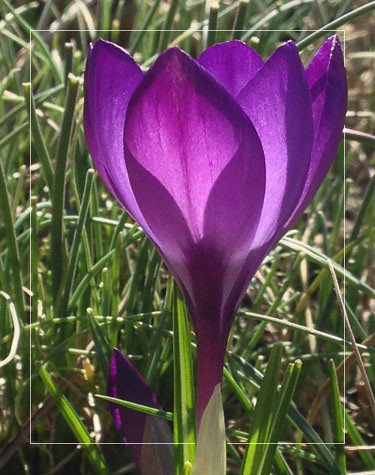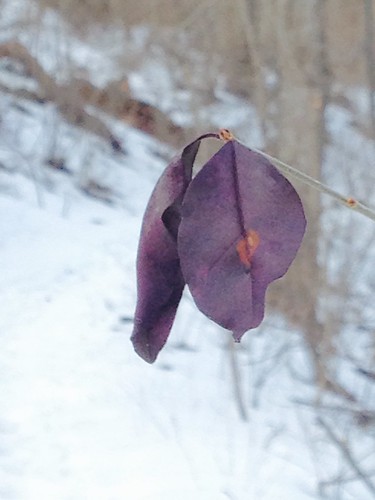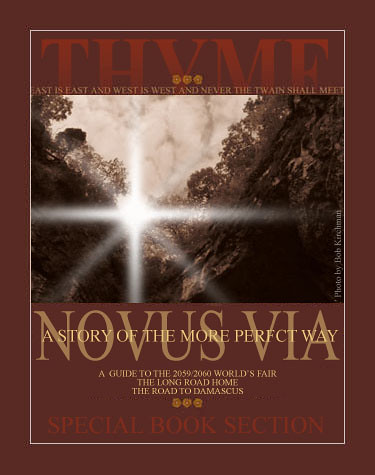
Volume XI, Issue VIII
The Snow Queen
by Hans Christian Andersen
SEVENTH STORY. What Took Place in the Palace of the
Snow Queen, and what Happened Afterward
The walls of the palace were of driving snow, and the windows and doors of cutting winds. There were more than a hundred halls there, according as the snow was driven by the winds. The largest was many miles in extent; all were lighted up by the powerful Aurora Borealis, and all were so large, so empty, so icy cold, and so resplendent! Mirth never reigned there; there was never even a little bear-ball, with the storm for music, while the polar bears went on their hindlegs and showed off their steps. Never a little tea-party of white young lady foxes; vast, cold, and empty were the halls of the Snow Queen. The northern-lights shone with such precision that one could tell exactly when they were at their highest or lowest degree of brightness. In the middle of the empty, endless hall of snow, was a frozen lake; it was cracked in a thousand pieces, but each piece was so like the other, that it seemed the work of a cunning artificer. In the middle of this lake sat the Snow Queen when she was at home; and then she said she was sitting in the Mirror of Understanding, and that this was the only one and the best thing in the world.
Little Kay was quite blue, yes nearly black with cold; but he did not observe it, for she had kissed away all feeling of cold from his body, and his heart was a lump of ice. He was dragging along some pointed flat pieces of ice, which he laid together in all possible ways, for he wanted to make something with them; just as we have little flat pieces of wood to make geometrical figures with, called the Chinese Puzzle. Kay made all sorts of figures, the most complicated, for it was an ice-puzzle for the understanding. In his eyes the figures were extraordinarily beautiful, and of the utmost importance; for the bit of glass which was in his eye caused this. He found whole figures which represented a written word; but he never could manage to represent just the word he wanted--that word was "eternity"; and the Snow Queen had said, "If you can discover that figure, you shall be your own master, and I will make you a present of the whole world and a pair of new skates." But he could not find it out.
I am going now to warm lands," said the Snow Queen. "I must have a look down into the black caldrons." It was the volcanoes Vesuvius and Etna that she meant. "I will just give them a coating of white, for that is as it ought to be; besides, it is good for the oranges and the grapes." And then away she flew, and Kay sat quite alone in the empty halls of ice that were miles long, and looked at the blocks of ice, and thought and thought till his skull was almost cracked. There he sat quite benumbed and motionless; one would have imagined he was frozen to death.
Suddenly little Gerda stepped through the great portal into the palace. The gate was formed of cutting winds; but Gerda repeated her evening prayer, and the winds were laid as though they slept; and the little maiden entered the vast, empty, cold halls. There she beheld Kay: she recognised him, flew to embrace him, and cried out, her arms firmly holding him the while, "Kay, sweet little Kay! Have I then found you at last?"
But he sat quite still, benumbed and cold. Then little Gerda shed burning tears; and they fell on his bosom, they penetrated to his heart, they thawed the lumps of ice, and consumed the splinters of the looking-glass; he looked at her, and she sang the hymn:
The rose in the valley is blooming so sweet,
And angels descend there the children to greet."
Hereupon Kay burst into tears; he wept so much that the splinter rolled out of his eye, and he recognised her, and shouted, "Gerda, sweet little Gerda! Where have you been so long? And where have I been?" He looked round him. "How cold it is here!" said he. "How empty and cold!" And he held fast by Gerda, who laughed and wept for joy. It was so beautiful, that even the blocks of ice danced about for joy; and when they were tired and laid themselves down, they formed exactly the letters which the Snow Queen had told him to find out; so now he was his own master, and he would have the whole world and a pair of new skates into the bargain.
Gerda kissed his cheeks, and they grew quite blooming; she kissed his eyes, and they shone like her own; she kissed his hands and feet, and he was again well and merry. The Snow Queen might come back as soon as she liked; there stood his discharge written in resplendent masses of ice.
They took each other by the hand, and wandered forth out of the large hall; they talked of their old grandmother, and of the roses upon the roof; and wherever they went, the winds ceased raging, and the sun burst forth. And when they reached the bush with the red berries, they found the Reindeer waiting for them. He had brought another, a young one, with him, whose udder was filled with milk, which he gave to the little ones, and kissed their lips. They then carried Kay and Gerda--first to the Finland woman, where they warmed themselves in the warm room, and learned what they were to do on their journey home; and they went to the Lapland woman, who made some new clothes for them and repaired their sledges.
The Reindeer and the young hind leaped along beside them, and accompanied them to the boundary of the country. Here the first vegetation peeped forth; here Kay and Gerda took leave of the Lapland woman. "Farewell! Farewell!" they all said. And the first green buds appeared, the first little birds began to chirrup; and out of the wood came, riding on a magnificent horse, which Gerda knew (it was one of the leaders in the golden carriage), a young damsel with a bright-red cap on her head, and armed with pistols. It was the little robber maiden, who, tired of being at home, had determined to make a journey to the north; and afterwards in another direction, if that did not please her. She recognised Gerda immediately, and Gerda knew her too. It was a joyful meeting.
You are a fine fellow for tramping about," said she to little Kay; "I should like to know, faith, if you deserve that one should run from one end of the world to the other for your sake?"
But Gerda patted her cheeks, and inquired for the Prince and Princess.
They are gone abroad," said the other.
But the Raven?" asked little Gerda.
Oh! The Raven is dead," she answered. "His tame sweetheart is a widow, and wears a bit of black worsted round her leg; she laments most piteously, but it's all mere talk and stuff! Now tell me what you've been doing and how you managed to catch him."
And Gerda and Kay both told their story.
And "Schnipp-schnapp-schnurre-basselurre," said the robber maiden; and she took the hands of each, and promised that if she should some day pass through the town where they lived, she would come and visit them; and then away she rode. Kay and Gerda took each other's hand: it was lovely spring weather, with abundance of flowers and of verdure. The church-bells rang, and the children recognised the high towers, and the large town; it was that in which they dwelt. They entered and hastened up to their grandmother's room, where everything was standing as formerly. The clock said "tick! tack!" and the finger moved round; but as they entered, they remarked that they were now grown up. The roses on the leads hung blooming in at the open window; there stood the little children's chairs, and Kay and Gerda sat down on them, holding each other by the hand; they both had forgotten the cold empty splendor of the Snow Queen, as though it had been a dream. The grandmother sat in the bright sunshine, and read aloud from the Bible: "Unless ye become as little children, ye cannot enter the kingdom of heaven."
And Kay and Gerda looked in each other's eyes, and all at once they understood the old hymn:
The rose in the valley is blooming so sweet,
And angels descend there the children to greet."
There sat the two grown-up persons; grown-up, and yet children; children at least in heart; and it was summer-time; summer, glorious summer!

Leaf Seen on the Appalachian Trail in Winter. Photo by Bob Kirchman.
Of Witches and Wardrobes
That Hideous Strength: A Modern Fairy-Tale for Grown-Ups
Original 1943 Preface
I have called this a ‘fairy tale’ in the hope that no one who dislikes fantasy may be misled first two chapters into reading further, and then complain of his disappointment. If you ask why—intending to write about magicians, devils, pantomime animals, and planetary angels, I nevertheless begin with such humdrum scenes and persons—reply that I am following the traditional fairy-tale. We do not always notice its method because the cottages, castles, woodcutters, and petty kings with which a fairy-tale opens have become to us as remote as the witches and ogres to which it proceeds. But they were not remote at all to the men who made and first enjoyed the stories. They were indeed more realistic or common place than Bracton College is to me: for many German peasants had actually met cruel stepmothers, whereas I have never, in any university, come across a college like Bracton.
This is a ‘tall story’ about devilry, though it has behind it a serious ‘point’ which I have tried to make in my ‘Abolition of Man.’ In the story the outer rim of that devilry had to be shown touching the life of some ordinary and respectable profession. I selected my own profession, not, of course, because I think Fellows of Colleges more likely to be thus corrupted than anyone else, but because my own profession I know well enough to write about. A very small university is imagined because that has certain conveniences for fiction. Edgestow has no resemblance, save for its smallness, to Durham—a university with which the only connection I have ever had was entirely pleasant.
I believe that one of the central ideas of this tale came into my head from conversations I had with a scientific colleague, some time before I met a rather similar suggestion in the works of Mr. Olaf Stapledon. If I am mistaken in this, Mr. Stapledon is so rich in invention that he can well afford to lend, and I admire his invention (though not his philosophy) so much that I should feel no shame to borrow.
Those who would like to learn further about Numinor and the True West must (alas!) await the publication of much that still exists only in the MSS. of my friend, Professor J. R. R. Tolkien. The period of this story is vaguely “after the war.” It concludes the trilogy of which Out of the Silent Planet was the first part, and Perelandra the second, but can be read on its own." --
C.S. Lewis, Madgalen College, Oxford, Christmas Eve, 1943.
I doubt whether we are sufficiently attentive to the importance of elementary text books. That is why I have chosen as the starting-point for these lectures a little book on English intended for 'boys and girls in the upper forms of schools'. I do not think the authors of this book (there were two of them) intended any harm, and I owe them, or their publisher, good language for sending me a complimentary copy. At the same time I shall have nothing good to say of them. Here is a pretty predicament. I do not want to pillory two modest practising schoolmasters who were doing the best they knew: but I cannot be silent about what I think the actual tendency of their work. I therefore propose to conceal their names. I shall refer to these gentlemen as Gains and Titius and to their book as The Green Book. But I promise you there is such a book and I have it on my shelves." -- C. S. Lewis in The Abolition of Man
That Hideous Strength [click to read]
The Abolition of Man [click to read]
Coming March 1
What would a world removed of its G-dly influence look like... would it usher in the great new society that some thinkers believe it would?... or would it be something unimaginable?

